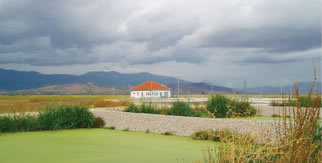
Management, Economics and Policy
New Approaches in Decentralized Water Infrastructure
Publication Date: May 2008
Cooperating Institution: Coalition for Alternative Wastewater Treatment (CAWT)
Sub-Grantee: Valerie Nelson
Project Budget: $225,650
Project Identifier: 04-DEC-5SG
DESCRIPTION
Decentralized water technologies and designs, such as water-efficient appliances, rooftop rain gardens, and onsite wastewater treatment and reuse, are the keys to enhancing the performance of the nation’s aging centralized water and sewer systems and to assuring adequate water supplies and healthy ecosystems into the future. Decentralized systems also create a host of other benefits for communities, including energy savings, improvements in air quality, creation of green spaces, restoration of streams, aquifers, wetlands, and habitat, and stimulus for new green companies and jobs.
In spite of these multiple benefits, however, there is a realistic fear that inertia and drag in the public-private institutional framework of water infrastructure could forestall the adoption of decentralized designs. This project explores the various pressures or drivers—as well as the impediments—for a change in the fundamental “paradigm” of water management. A series of workshops with experts and advocates was convened to explore the institutional issues and to tease out various new strategies for jump-starting and easing a transition.
Recommended strategies include incorporation of water concerns into the Green Building movement and funding of community demonstration projects. A second strategy is to support a multi-faceted conversation about sustainable water infrastructure with academics, entrepreneurs, engineers, activists, public bureaucrats and managers, and the public. Finally, as more is learned about what works and what does not work, and as the new approach becomes better-understood and better-known across a broad range of constituencies, there can be enough of a groundswell of support for a serious restructuring of water institutions and policies.
This restructuring will include: an integration of planning, funding, and regulations across the currently segmented fields of water, stormwater, and wastewater; an expanded role for the private sector in technology development, systems management, and finance; a closer link between professional practice and community participation; and careful management and stimulus of continuous innovation and reform.

